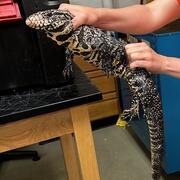Biology, Impacts and Control of Invasive Reptiles in the Everglades
Invasive species are considered to be second only to habitat degradation in terms of negative impacts on the Earth’s ecosystems, and our scientists make up a significant proportion of the global expertise in the rapidly-growing problem of invasive reptiles.

FORT's invasive reptile research in Florida focuses on understanding impacts and developing adaptive control opportunities for Burmese pythons and other recent invaders such as black and white tegus. Branch scientists combine extensive herpetological expertise with cutting-edge quantitative skills to inform and estimate detection probability, population size, and eradication prospects for a range of invasive reptiles. Projects and collaborators span across the United States mainland to Pacific islands.
Below are other science projects associated with this project.
Invasive Burmese python research in the Greater Everglades
Early detection and rapid response tools for invasive tegu lizards
Multi-year Burmese Python Vital Rate Research Collaborative in the Greater Everglades
State Partnerships in South Florida
Ecology and Control of Invasive Reptiles in Florida
Mentoring the next generation: USGS, NPS, and University of Florida Cooperative Research Unit Invasive Reptile Intern Program
Giant Constrictor Snakes in Florida: A Sizeable Research Challenge
Below are publications associated with this project.
Coelomic foreign bodies in wild-caught Python spp. in the Greater Everglades Ecosystem, Florida, USA Coelomic foreign bodies in wild-caught Python spp. in the Greater Everglades Ecosystem, Florida, USA
An Eastern Ribbonsnake, Thamnophis sauritus (Linnaeus, 1766), scavenging on a roadkilled Cuban Treefrog, Osteopilus septentrionalis, (Duméril & Bibron, 1841), in Everglades National Park, Florida, USA An Eastern Ribbonsnake, Thamnophis sauritus (Linnaeus, 1766), scavenging on a roadkilled Cuban Treefrog, Osteopilus septentrionalis, (Duméril & Bibron, 1841), in Everglades National Park, Florida, USA
Wild Burmese python nest site selection, thermogenesis, and brooding behaviors in the Greater Everglades Ecosystem Wild Burmese python nest site selection, thermogenesis, and brooding behaviors in the Greater Everglades Ecosystem
An early detection rapid response case study of the Black and White Tegu (Salvator merianae) and implications for a broader framework An early detection rapid response case study of the Black and White Tegu (Salvator merianae) and implications for a broader framework
Using camera traps to estimate site occupancy of invasive Argentine Black and White Tegus (Salvator merianae) in South Florida Using camera traps to estimate site occupancy of invasive Argentine Black and White Tegus (Salvator merianae) in South Florida
Double take: Ingestion of two rats by a juvenile Burmese Python (Python bivittatus) in Big Cypress National Preserve, FL, USA Double take: Ingestion of two rats by a juvenile Burmese Python (Python bivittatus) in Big Cypress National Preserve, FL, USA
Flooding-induced failure of an invasive Burmese Python nest in southern Florida Flooding-induced failure of an invasive Burmese Python nest in southern Florida
Florida Kingsnake (Lampropeltis floridana) consumes a juvenile Burmese Python (Python molurus bivitattus) in southern Florida Florida Kingsnake (Lampropeltis floridana) consumes a juvenile Burmese Python (Python molurus bivitattus) in southern Florida
Capsaicin-treated bait is ineffective in deterring non-target mammals from trap disturbance during invasive lizard control Capsaicin-treated bait is ineffective in deterring non-target mammals from trap disturbance during invasive lizard control
Testicular abnormalities in the invasive Argentine Black-and-White Tegu lizard (Salvator merianae) in the Florida Everglades Testicular abnormalities in the invasive Argentine Black-and-White Tegu lizard (Salvator merianae) in the Florida Everglades
Maximum clutch size of an invasive Burmese Python (Python bivittatus) in Florida, USA Maximum clutch size of an invasive Burmese Python (Python bivittatus) in Florida, USA
Natives bite back: Depredation and mortality of invasive juvenile Burmese pythons (Python bivittatus) in the Greater Everglades Ecosystem Natives bite back: Depredation and mortality of invasive juvenile Burmese pythons (Python bivittatus) in the Greater Everglades Ecosystem
Invasive species are considered to be second only to habitat degradation in terms of negative impacts on the Earth’s ecosystems, and our scientists make up a significant proportion of the global expertise in the rapidly-growing problem of invasive reptiles.

FORT's invasive reptile research in Florida focuses on understanding impacts and developing adaptive control opportunities for Burmese pythons and other recent invaders such as black and white tegus. Branch scientists combine extensive herpetological expertise with cutting-edge quantitative skills to inform and estimate detection probability, population size, and eradication prospects for a range of invasive reptiles. Projects and collaborators span across the United States mainland to Pacific islands.
Below are other science projects associated with this project.
Invasive Burmese python research in the Greater Everglades
Early detection and rapid response tools for invasive tegu lizards
Multi-year Burmese Python Vital Rate Research Collaborative in the Greater Everglades
State Partnerships in South Florida
Ecology and Control of Invasive Reptiles in Florida
Mentoring the next generation: USGS, NPS, and University of Florida Cooperative Research Unit Invasive Reptile Intern Program
Giant Constrictor Snakes in Florida: A Sizeable Research Challenge
Below are publications associated with this project.








